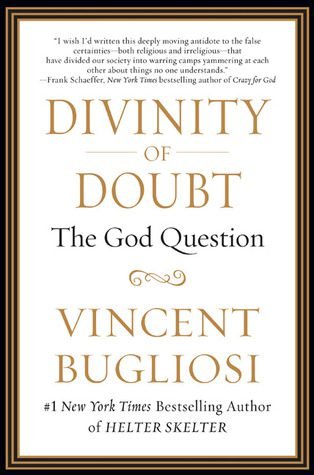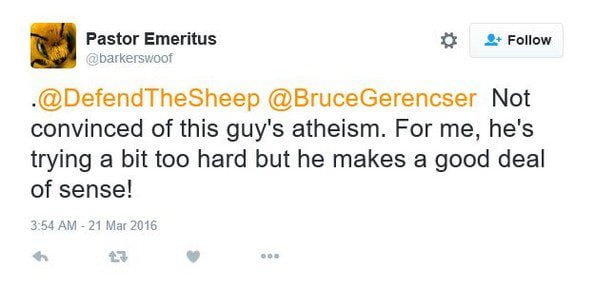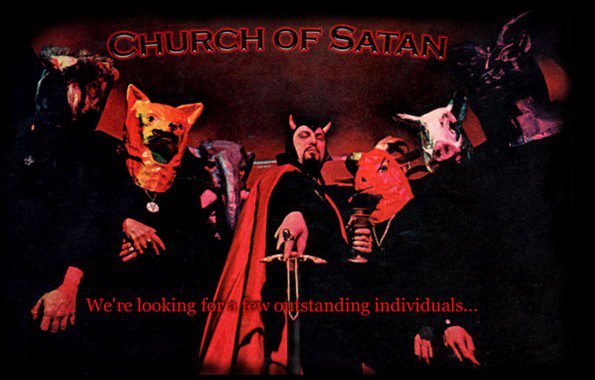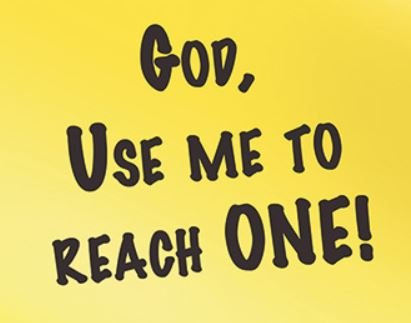
Christianity offers its followers the promise of life after death. No matter how difficult and painful this life is, Christians are promised wonderful lives after death living with Jesus and their fellow Christians in a perfect, pain-free heaven. While I wonder how heavenly it is to spend your life prostrate before God worshiping him, Christians live in the hope that someday they will take possession of a room in the Father’s house, built especially just for them. (John 14) Without the promise of life after death in heaven, I wonder if most Christians would still be willing to forgo the pleasures of this life? While some Christians would argue that living according to the laws, teachings, and precepts of the Bible is still a good way to live, I suspect most Christians — without the promise of eternal life and bliss — would quickly abandon their houses of worship, joining people such as myself at the local pub or the church of the NFL. After all, even the apostle Paul said, If in this life only we have hope in Christ, we are of all men most miserable. (1 Corinthians 15:19) Evidently, Paul thought that in this life only Christianity had little to offer. And so Sunday after Sunday, Christian preachers promise parishioners a home awaits them in heaven. According to the Bible, God promises some day to give Christians the desires of their hearts. Wait. Does that mean there will be booze, porn, cigars, dirt track racing, and hunting in heaven? Will heavenly citizens spend their days playing Nintendo or Xbox games? Will God really give Christians the desires of their hearts? Hmm, this got me thinking about the whole going-to-heaven thing. I know a con job when I hear it. What better way to get people to buy what you are selling than to promise them that they will have a wonderful life if they will just sign on the dotted line. A wonderful life, that is, someday, after you have made the 666 monthly payments and died.
Atheism offers no such promises. Atheism is rooted in a humanistic and secularist view of the world. No promises of a divine life in the sweet by and by. Life is hard, and then you die. No promises of blessings in this life or the life to come. Some have argued that atheists have a cold, sterile outlook on life. To some degree this is true. Atheists are realists, knowing they only get one shot at life— best get to living it. Life is what we make it, and even when hard times come (and they will most certainly come), atheists find a way to make the most of it. I could spend my days whining and complaining about my health problems, but what good would that do? Instead, I turn my pain and suffering into a platform for helping others. I can look at the five decades I spent in the Christian church and say, what a waste, but I choose to use these experiences as an opportunity to help others. I know that this is the only life I have, and it is up to me to make the most of it. Spending time wondering about what might have been accomplishes nothing. As my family has heard me say many times, it is what it is. Sure, if there were some magical way to redo certain things from my past I might do it. But maybe not. Polly and I will celebrate our 38th wedding anniversary this July. We met at a Fundamentalist Bible college. If nothing else good came out of our past, both of us would say — on most days — that our relationship was the best thing about our years in Evangelicalism. I would not want anyone to follow the same path we did, yet we do have six wonderful children and 11 awesome grandchildren. They indeed are the bright spots of the years we spent working in God’s coal mine. I have learned, or perhaps I am learning, to reflect on the good of the past, and use the bad things to fuel my writing and my attempts to help others avoid similar paths.
I will celebrate my 59th birthday in June. I have lived 12 years longer than my mother and five years longer than my dad. There are days when my body is so overwhelmed with pain that I wonder if I can live another day. The means of my demise are always nearby, yet despite my suffering I choose to live. Why? Because this is the only life I will ever have. I only have one opportunity to love Polly, Jason, Nathan, Jaime, Bethany, Laura, Josiah, my grandchildren, my brother and sister, and Polly’s mom and dad. I know that when I draw my last breath, there will be no family circle meeting in the sky — sorry Johnny! This is why I want to live each and every day to its fullest. This is not a cliché to me. This life matters. My wife, children, grandchildren, son-in-law, daughters-in-law, siblings, extended family, and friends matter to me. I know that I am only going to see them and enjoy their company in this life. There are places I want to go to and see. I want to enjoy and experience the fullness of what it means to be human. And since casting off the shackles of religion, I have been free to drink deeply of the human experience. No longer fearful of God’s judgment or hell, I am free to see, touch, taste, and hear the things I desire. Yes, there is that dirty word that dare not be spoken in Evangelical churches — desire. I spent way too many years denying passions, desires, wants, and needs, all for the sake of God, Jesus, the church, and the ministry. No more. It is wonderful to do something just because I want to. I do not have to pray about it or see if the Bible approves of it. Bruce approves, end of discussion.
When I write posts such as this, there are always a few horse-bridled Christians who let me know that there is coming a day when I will regret not bowing to the will of the S&M master, Jesus. Someday Bruce, Evangelical zealots tell me, God is going to make you pay for your attacks on Christianity. Someday, God is going to judge you for your wanton living and rejection of the Bible. Sometimes, I think Christians such as these people relish the day when God is going to give atheist Bruce Gerencser an eternal ass-whipping. I am sure they will be standing among the crowd cheering and saying to God, hit him again! He deserves it, Lord.
I have been blogging now for going on nine years. I left Christianity in 2008, and since then countless Evangelicals — along with a few Catholics — have attempted to win me back to Jesus through the use of Pascal’s Wager. The basic premise is this, Bruce, what if you are wrong? Good question. Since I am not infallible, nor do I have at my disposal the sum of all human knowledge and experience, all I can do is make reasoned, knowledgeable decisions based on the evidence at hand. I can tell readers this much: I have been wrong many, many times. Not only that, I have made enough mistakes that if you piled them up they would reach to the International Space Station. I am, after all, a feeble, frail, and at times contradictory, human being. I can, like all people, be led astray by my passions, judgments, or incomplete information. I am not immune to irrationality and cognitive dissonance. However, when it comes to Christianity and its promises of eternal life in heaven or judgment in hell, it is my educated opinion that the claims of Christianity are false. Trying to get me to choose Jesus just in case I am wrong makes a mockery of intellectual inquiry (and Christianity). Having spent most of my adult life in the Christian church and 25 years studying and preaching the Bible, I think it is safe to say that I know a good bit about Christianity. I cannot remember the last time that some Christian presented me with something I have not heard before. I am not being arrogant here — as I am sure some Christians will allege. I spent decades reading and studying the Bible — devouring countless Christian books. I immersed myself in Christianity and its teachings, so when I say I am no longer a Christian because I think the claims of Christianity and the Bible are false, my conclusions — unlike many Christian opinions of atheism — come from an educated, reasoned, well-thought-out position. Do I know everything there is to know about Christianity? Of course not, but I sure as hell know more than most the Christians (and preachers) I come in contact with on a day-to-day basis. My point is this: I am an atheist today, not out of ignorance, but because I weighed Christianity in the balance and found it wanting.
If Christians come up with new evidences for the veracity of their claims — and I doubt they ever will — then I will gladly consider them. Until then, I am content to number myself among the godless. And when I die, I hope to leave this life knowing that I did what I could to be a help to others. I hope, on the day that my ashes are scattered along the shores of Lake Michigan, that my family and friends will speak well of me. I hope that none of them will have to lie, but that they will truly believe that my good works outweigh the bad. This is why I think that is important to finish well. I am sure Polly and my children have less-than-complimentary stories they could tell at my wake, but I hope, because I have made a concerted effort to be a better man, that they will share stories about a good man who just so happened to be an atheist.
I am often asked if I fear death. Yes and no. Since no one has died and come back to life — including Jesus — I do fear the blackness that awaits. There are been those times, late at night, when I have pondered being alive one moment and dead the next; going to sleep and never waking up. But this fear does not overwhelm me. I know that I cannot do anything about dying. It is, to quote the Lion King, the circle of life. We are born, we live, we die. End of story. All I know to do is to live a good life and be a good husband, father, grandfather, friend, and fellow citizen of earth. I have had the privilege of living at this time on humanity’s calendar, and when it comes time for me to draw my last breath, I hope my dying thoughts will be those of love. Love of family, love of friends, love of writing, love of photography, and love of all those who have made my life worth living. Will that not be what all of us desire? To love and to be loved? As dying pushes away all the minutia of life, what remains is love. For me, that will be enough.
Share This Post On Social Media:








 Evangelicals sincerely believe that they love and accept people as they are. Some will even say that they love everyone unconditionally. (Please see
Evangelicals sincerely believe that they love and accept people as they are. Some will even say that they love everyone unconditionally. (Please see 